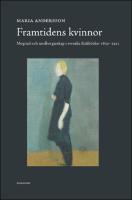Framtidens kvinnor
Mognad och medborgarskap i svenska flickböcker 1832–1921
Abstract
The future woman – what would she be like? And what would be her place in society? These questions were explored through stories about girls’ upbringing and education in nineteenth and early twentieth century literature for girls. About the time of the breakthrough of women novelists in the 1830s, books for girls started to be published. They depict everyday games and exhilarating adventures, student life and vocational dreams. By addressing girls directly, these books aimed at both discussing and influencing future female citizens. In Future Women, Maria Andersson shows how Swedish literature for girls and its depiction of young women was a part of the nineteenth century debate on women’s civil and political rights. The genre gathered authors of different political convictions but they were all united by the fact that young women became the focal point of contemporary social changes in their works. Housewifely girls, manly women students and shopping coquettes illustrated different paths to adulthood and modern life. In the girl book genre, the young woman was simultaneously a vehicle of nostalgic memories from a lost world and the promise of a more equal, peaceful future.
Keywords
Gunnar Örnulf; Elna Wide; Gerda Meyerson; Hedda Anderson; Hedvig Svedenborg; Carl Sundbeck; Ulrika von Strussenfelt; Elisabeth Kuylenstierna-Wenster; Cecilia Milow; Ellen Idström; Women’s Suffrage; Girls’ Education; Citizenship; Women Authors; Intersectionality; Girls’ LiteratureDOI
10.22188/kriterium.26ISBN
9789170613319, 9789170618314, 9789170613319Publisher
KriteriumPublication date and place
Gothenburg, 2021Classification
Children’s & teenage literature studies
Gender studies, gender groups
Literary studies: poetry & poets
History
Children’s and teenage literature studies: general
Gender studies, gender groups
Literary studies: poetry and poets
History


 Download
Download